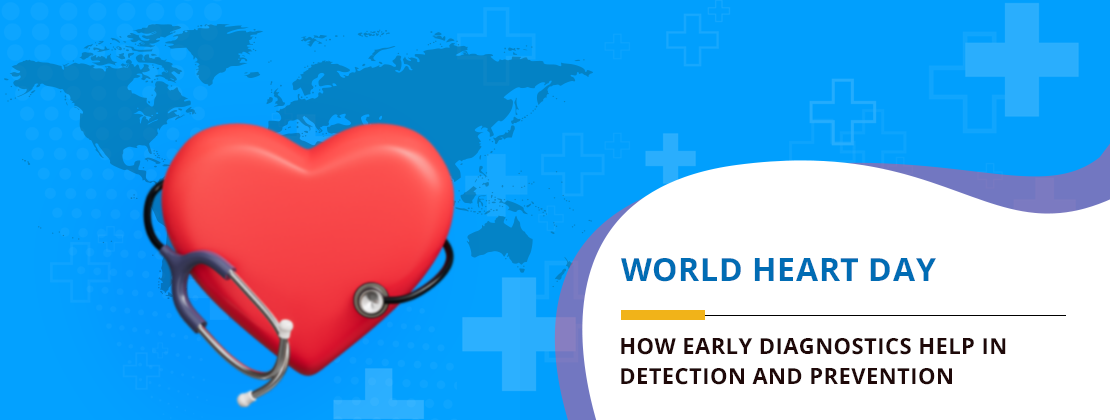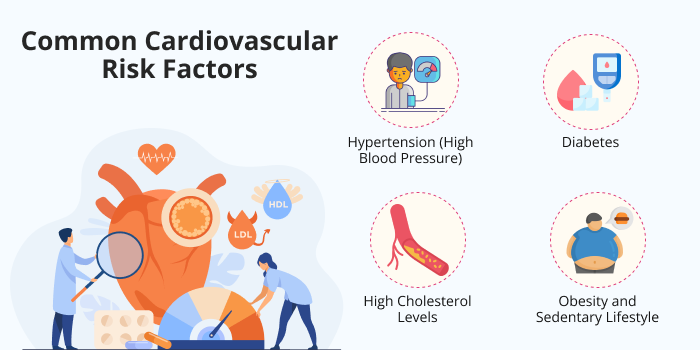
Home / Blog / World Heart Day: How Early Diagnostics Help in Detection and Prevention
September 22, 2025
World Heart Day is observed worldwide every 29th of September to raise awareness of heart diseases and promote their prevention. For the observance of World Heart Day 2025 in Ahmedabad, the focus is on how early diagnostics can play a life-saving role in detecting heart conditions before they become critical.
This year, across the world, World Heart Day was celebrated under the theme “Don’t Miss a Beat”. Emphasising the importance of paying close attention to your heart health and responding fast enough to any symptoms that may indicate trouble. The fact that cardiovascular diseases are still the number one cause of death globally makes it more important now than ever to raise awareness about prioritising cardiac health and encourage early detection and timely interventions.
Importance of Raising Awareness
World Heart Day is not just about spreading knowledge; it is about inspiring action. Events such as heart checkup camps allow people to get screened for risk factors like high blood pressure, cholesterol, or irregular heart rhythms.
Early identification of these risks enables cardiology specialists to nudge people towards preventive care, treatment options, and lifestyle changes promptly before the emergence of severe complications.
Early detection of cardiovascular conditions can mean the difference between long-term wellness and life-threatening emergencies. Timely diagnosis helps in:

Heart diseases often result from a combination of risk factors. Some of the most common include:

Standard Tests for Cardiac Health
HCG Hospitals, recognised among the best heart hospitals in Ahmedabad, is at the forefront of adopting advanced diagnostic technologies for heart care. We employ the following tests to detect and diagnose various heart conditions.
Advancements in Early Diagnostic Tests
One of the latest advancements is 3D echocardiography, which gives better images that can be used to identify valve diseases and cardiac abnormalities at their early stages.
The use of cardiac MRI with AI assistance is a breakthrough that helps cardiologists in recognising even the smallest anomalies in heart tissue. On top of that, there are new high-sensitivity cardiac biomarkers, which can be used to detect any harm to the heart at a stage when clinical symptoms are still not apparent.
Many hospitals are using AI-driven risk assessment tools; these tools combine patient history, genetic predispositions, and real-time data from wearable devices. By enabling personalised preventive treatment, these instruments can predict the risk of heart disease more accurately.
By combining conventional methods like ECG and TMT with advanced diagnostics, leading cardiology hospitals in Ahmedabad, like HCG Hospitals, are providing more accurate, faster, and safer heart checkups for patients of all ages.

Technology continues to revolutionise heart care:
Prevention is better than cure, although diagnosis is important. According to cardiologists:
Additional Reading: How to Prevent Heart Disease: Tips for a Stronger, Healthier Heart – HCG Hospitals
This World Heart Day, the message is clear: don’t wait for symptoms; get a heart checkup today. Early detection not only prevents severe conditions like heart attacks and strokes, but it also facilitates early adoption of healthy living, which can increase one’s lifespan.
Undergoing regular heart health checkups and consulting with specialists at the best heart hospitals in Ahmedabad, like HCG Hospitals, are small steps that lead to a happy and healthy life.
Every year on September 29th, people all over the world celebrate World Heart Day with the aim of educating society about heart diseases and promoting healthy living.
The theme for World Heart Day 2025 is “Don’t Miss a Beat”, highlighting how preventable cardiovascular disease (CVD) is.
Early diagnosis prevents life-threatening diseases by identifying hidden risk elements such as high blood pressure and cholesterol.
ECG, echocardiogram, TMT, and 2D echo are widely used for the early detection of heart diseases.
This enables one to receive treatment in good time and make changes in their way of life so that it does not develop into a serious illness.
A healthy diet, exercise, stress management, and avoiding tobacco or alcohol are recommended to prevent serious heart conditions.
Identifying risks at an early stage helps in taking precautionary measures to prevent any complications.